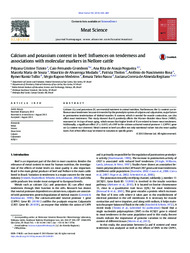Calcium and potassium content in beef: influences on tenderness and associations with molecular markers in Nellore cattle.
Calcium and potassium content in beef: influences on tenderness and associations with molecular markers in Nellore cattle.
Author(s): TIZIOTO, P. C.; GROMBONI, C. F.; NOGUEIRA, A. R. de A.; SOUZA, M. M. de; MUDADU, M. de A.; THOLON, P.; ROSA, A. do N.; TULLIO, R. R.; MEDEIROS, S. R. de; NASSU, R. T.; REGITANO, L. C. de A.
Summary: Calcium (Ca) and potassium (K) are essential nutrients in animal nutrition. Furthermore, the Ca content can influence meat tenderness because it is needed by the proteolytic system of calpains and calpastatins, major factors in postmortem tenderization of skeletal muscles. K content, which is needed for muscle contraction, can also affect meat tenderness. This study showed that K positively affects the Warner-Bratzler shear force (WBSF), measured at 14days of meat aging, which means that higher levels of K are related to lower meat tenderness. Additionally, a significant effect (P?0.015) of a SNP in the calcium-activated neutral protease 1 (CAPN1) gene on Ca content was observed. Metal content in beef can affect not only nutritional values but also meat quality traits. Part of this effect may be related to variation in specific genes.
Publication year: 2014
Types of publication: Journal article
Keywords: Carne, Ionone, KCNJ11, Metal, Nutrição animal, Shear force, calpain, calpastatin
Observation
Some of Embrapa's publications are published as ePub files. To read them, use or download one of the following free software options to your computer or mobile device. Android: Google Play Books; IOS: iBooks; Windows and Linux: Calibre.
Access other publications
Access the Agricultural Research Database (BDPA) to consult Embrapa's full library collection and records.
Visit Embrapa Bookstore to purchase books and other publications sold by Embrapa.

